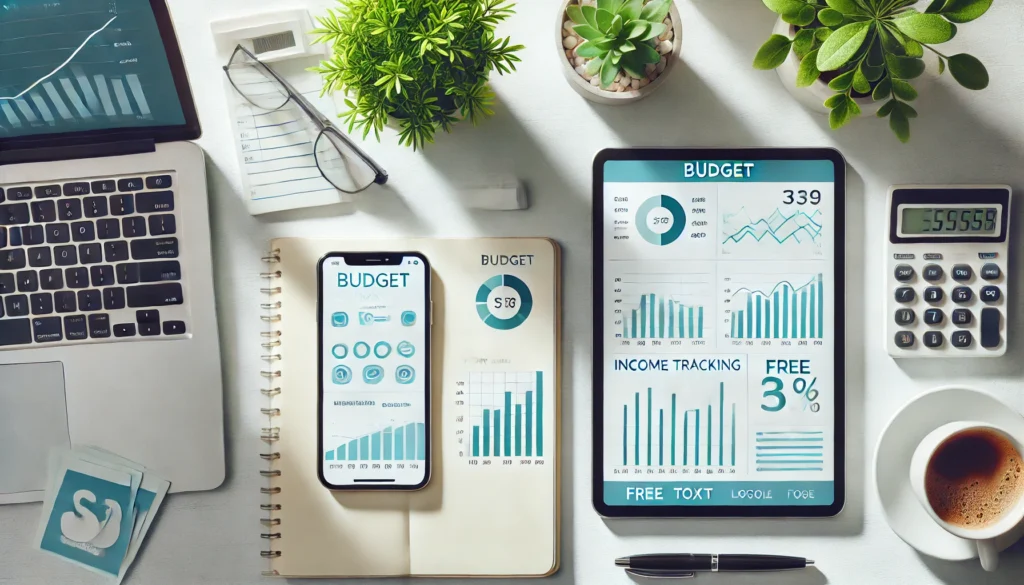Introduction: Rethinking Frugality in a Digitally Empowered Age
In today’s world of rising living costs and economic uncertainty, frugal living is no longer a fringe lifestyle—it’s a smart financial strategy embraced by households across all income levels. But as frugality evolves from coupon clipping to comprehensive financial planning, the tools we use to manage our money must evolve as well. Enter the free income tracker: a deceptively simple yet profoundly transformative tool that has the power to overhaul how we interact with our finances. For those committed to living wisely, cutting waste, and maximizing every dollar, understanding the potential of a high-quality income and expense tracker is key to long-term success.
You may also like: 10 Genius Frugal Living Hacks: Effective Ways to Save Money on Household Bills
What separates a free income tracker from a spreadsheet hastily jotted down in a notebook isn’t just digital convenience. It is the depth of insight it offers, the behavioral patterns it uncovers, and the informed decisions it empowers. And unlike premium financial software that comes with a hefty monthly fee, a well-designed, no-cost income and expenditure tracker provides a comparable level of control, clarity, and consistency—without compromising your budget. In fact, using a free income tracker may be the most frugal decision you make all year.
As we unpack the advantages of adopting a free income tracker into your daily routine, we’ll explore how it can reveal hidden spending habits, enhance your savings goals, and support a more intentional, values-driven approach to frugal living. Whether you’re new to budgeting or a seasoned saver looking to sharpen your strategy, this comprehensive guide offers practical insights grounded in real-world application.

Understanding the Role of Income Tracking in Frugal Living
At the heart of every frugal lifestyle is awareness: knowing exactly where your money comes from, where it goes, and how you can make it stretch further. This is where the income tracker steps into the spotlight. Unlike basic budget templates that simply set spending limits, an income and expense tracker takes a granular look at your cash flow. It lets you record, categorize, and analyze every dollar earned and every cent spent.
For frugal households, this level of detail is invaluable. Rather than guessing how much you spend on groceries or estimating what you bring in through side gigs, a good income tracker turns speculation into precision. It allows you to challenge assumptions, uncover inefficiencies, and create a budget rooted in actual behavior rather than aspirational figures.
Moreover, an income and expenditure tracker supports dynamic budgeting. Life is fluid—unexpected medical bills, car repairs, freelance income fluctuations—and static budgets often fail to reflect this complexity. By continuously tracking income and expenses, you can adjust your budget in real-time, aligning it more closely with your current priorities and constraints.
Another key benefit lies in its ability to promote financial accountability. Tracking income and expenses creates a sense of ownership over your money. You begin to see spending as a choice, not an inevitability. And once you embrace that mindset, frugality transforms from a necessity into an empowering lifestyle.
The Psychological Power of Income Awareness
Frugal living is as much a mental game as it is a financial one. The choices we make about money are deeply tied to our habits, emotions, and social conditioning. Many of us underestimate how powerful self-awareness can be in altering these patterns. A free income tracker offers precisely that: a daily window into your financial behavior that prompts mindfulness and intentionality.
When you log your income and expenses regularly, you reinforce the habit of checking in with your goals. This isn’t about obsessive tracking but about building a reflective financial routine. Just as journaling can offer emotional clarity, tracking your finances offers fiscal clarity. You become more attuned to what brings value and what constitutes waste.
Furthermore, the act of recording itself has a deterrent effect on frivolous spending. It creates a natural pause between impulse and action. If you know you’ll have to input a $14 artisanal coffee or a $25 Uber ride, you’re more likely to reconsider those decisions in the moment. This feedback loop makes your spending more conscious and aligned with your values.
There’s also an emotional benefit to witnessing your progress over time. Watching your savings grow, your debt shrink, and your financial goals come closer to reality is a powerful motivator. It builds financial confidence—a priceless asset in any frugal household.
From Chaos to Clarity: How a Free Income Tracker Organizes Your Finances
For many people, the first step toward financial control is acknowledging the chaos. Without a clear system, it’s easy to lose track of paychecks, bills, automatic subscriptions, and variable income streams. A free income tracker functions as the central nervous system of your budget, bringing scattered data into one coherent picture.
This level of organization makes it easier to identify patterns. Are you consistently overspending on dining out? Is your freelance income steady or seasonal? Are your utility bills creeping up without notice? These are the kinds of insights that only structured tracking can reveal.
Moreover, having everything in one place reduces cognitive load. Instead of juggling bank statements, receipts, and mental notes, you have a single source of truth. This not only saves time but also minimizes financial anxiety. When you can see the full picture, you’re better equipped to plan ahead, make informed choices, and avoid the pitfalls of reactive budgeting.
An income and expense tracker also enhances financial transparency within households. For couples or families sharing financial responsibilities, it creates a common framework for discussion and decision-making. There’s less ambiguity, fewer misunderstandings, and greater cooperation.
Ultimately, organization isn’t just about neat spreadsheets or pretty graphs. It’s about creating a stable, supportive environment where your financial decisions are intentional, not accidental.
Leveraging Free Tools Without Compromising on Quality
Skepticism is natural when it comes to free financial tools. After all, many free apps are cluttered with ads, lack essential features, or upsell you at every turn. But in recent years, the quality of free income tracker tools has dramatically improved. Developers, driven by open-source philosophy or freemium business models, are producing highly functional, user-friendly trackers that rival their paid counterparts.
Some of the most popular free income tracker platforms offer cloud sync, customizable categories, visual analytics, and even integration with bank accounts. The key is to find one that aligns with your needs and comfort level. For those who value simplicity, a spreadsheet-based income and expenditure tracker might be ideal. Others may prefer mobile apps with built-in reminders, AI-based insights, and goal-tracking features.
The important point is this: free doesn’t have to mean inferior. In fact, frugality demands that we scrutinize value, not price alone. If a no-cost tool allows you to track income, manage expenses, and plan effectively, then it perfectly aligns with the principles of smart frugal living.
Equally crucial is data privacy. When evaluating a free tool, look for transparent privacy policies and encryption standards. Your financial data is sensitive and deserves secure handling—even more so when the service is free.
Ultimately, leveraging a free income tracker is about making strategic choices. You’re choosing to maximize utility while minimizing cost—a core tenet of frugal living at its best.
Customizing Your Income Tracker to Reflect Your Unique Financial Life
No two households are alike. Income sources vary widely, from salaried jobs to gig work, investment returns, and passive income streams. Likewise, expenses differ based on family size, geography, lifestyle, and personal values. That’s why a one-size-fits-all income tracker is rarely sufficient. To truly benefit, you need a customizable tool that adapts to your financial reality.
Start by defining income categories that reflect your unique streams of revenue. For example, if you drive for a rideshare service on weekends or sell items online, those should be separate income lines. This distinction helps you understand how diversified your earnings are and where your financial strengths lie.
The same applies to expenses. Rather than lumping all discretionary spending under “entertainment,” consider breaking it down into dining out, streaming services, hobbies, and gifts. The more granular your tracker, the more insight it offers.
Customization also allows you to track irregular or periodic income. For example, a bonus, tax refund, or cash gift might only appear once or twice a year, but including it helps create an accurate financial narrative.
By tailoring your income and expense tracker to reflect your personal situation, you gain clearer visibility and more actionable insights. You also increase the likelihood of sticking with the habit, since the tool becomes genuinely useful and relevant to your day-to-day life.
Transforming Budgeting from a Chore to a Routine
Many people resist budgeting because it feels restrictive, time-consuming, or overly complex. But a well-structured income and expenditure tracker can flip that script. When you track income and spending consistently, budgeting evolves from a burdensome task into a smooth, integrated part of your weekly rhythm.
This transformation is largely about mindset. Rather than seeing budgeting as a set of rules to follow, view it as a roadmap that guides your financial journey. The income tracker acts as your GPS, providing real-time feedback on where you are relative to your goals.
Once the process becomes familiar, it takes only minutes each day. The key is to make it routine: check your income tracker while sipping your morning coffee or review your weekly totals every Sunday evening. As with any habit, consistency is more important than perfection.
Over time, you’ll notice how this rhythm brings clarity and control. Unexpected expenses no longer cause panic because you’re prepared. Goals no longer feel abstract because they’re grounded in data. And money, rather than being a source of stress, becomes a tool for empowerment.
Turning budgeting into a routine doesn’t just save money. It saves mental energy, reduces stress, and fosters a proactive approach to life. That is the essence of intelligent frugal living.
Real-Life Success Stories: How Free Income Tracking Changed the Game
Consider Rachel, a schoolteacher living on a modest salary in a high-cost city. For years, she felt like she was always one step behind financially. Then she downloaded a free income tracker app recommended by a friend. Within three months, she identified a $200 monthly leak from impulse buys and unused subscriptions. She redirected that money into a savings fund, which eventually paid for a long-overdue dental procedure—in cash.
Or take James and Lisa, a dual-income couple with two kids. Despite earning a combined $120,000 a year, they felt constantly strapped for cash. After implementing a spreadsheet-based income and expense tracker, they discovered that weekday takeout lunches were draining $500 a month. By meal-prepping at home, they cut that figure by 80%, saving thousands annually and redirecting those funds to pay down their $20,000 student loan debt ahead of schedule.
Then there’s Ahmed, a freelance graphic designer. His income varied wildly, making budgeting feel impossible. But with a customized income and expenditure tracker, he began averaging out his income trends and planning for dry months. The result? He avoided credit card debt for the first time in his career and began investing consistently in a Roth IRA.
These stories reflect a common theme: awareness breeds transformation. A free income tracker doesn’t magically create money, but it uncovers the truth about your finances. And with that truth comes the power to change.

Frequently Asked Questions (FAQ): How a Free Income Tracker Can Transform Your Budget
1. How can an income tracker support long-term financial planning beyond simple budgeting?
An income tracker does far more than help you stay within monthly limits—it lays the foundation for strategic, long-term financial decision-making. By consistently analyzing your earnings over time, you gain clarity on income fluctuations, enabling more accurate forecasting for major life goals like buying a home, starting a business, or planning early retirement. When you use an income and expenditure tracker for years, you build a data-rich profile of your financial behavior, uncovering seasonal trends or patterns tied to life events. This perspective empowers you to anticipate lean months and plan savings buffers in advance. Unlike one-off budget apps, a reliable income and expense tracker becomes an evolving financial journal, aligning daily actions with future ambitions.
2. What overlooked psychological benefits come from using an income and expense tracker consistently?
The consistent use of an income and expense tracker can reshape your mindset about money in subtle but powerful ways. It nurtures a sense of agency, transforming financial stress into a manageable, quantifiable challenge. Instead of feeling at the mercy of bills or surprise expenses, users of a well-designed income tracker begin to see money as something they control—not the other way around. This psychological shift is particularly noticeable in those who’ve previously avoided financial planning out of anxiety. Over time, recording every dollar in a free income tracker promotes mindfulness, encouraging intentionality with spending and even reducing impulsive purchases by fostering awareness.
3. How can couples or families benefit from using a shared income and expenditure tracker?
Managing household finances collaboratively is one of the most challenging aspects of maintaining harmony, but a shared income and expenditure tracker can help bridge that gap. These tools offer full transparency, ensuring that everyone involved understands the collective cash flow. More importantly, a joint income tracker can facilitate regular check-ins and financial discussions, which are key to long-term alignment. Whether it’s tracking dual incomes, side hustles, or shared expenses like childcare and utilities, using an income and expense tracker creates an objective, data-driven space for decision-making. Families who use these tools often report fewer financial misunderstandings and more equitable division of responsibility.
4. What role does an income and expense tracker play in preparing for self-employment or freelance careers?
For those considering the leap into freelancing or self-employment, a robust income and expense tracker is non-negotiable. These careers often come with variable income streams and irregular payment cycles, making it difficult to rely on traditional budgeting strategies. By using an income tracker to document every payment and project-related expense, freelancers can stabilize their cash flow knowledge and make informed pricing decisions. Over time, this data becomes invaluable for tax planning, client negotiations, and identifying which gigs or contracts deliver the highest return on effort. A free income tracker that accommodates multiple income categories is especially helpful for side hustlers managing diverse revenue sources.
5. How do advanced users customize their income trackers to extract deeper insights?
Advanced users of income and expense trackers often move beyond default categories and build granular labels tailored to their lifestyle and goals. Instead of lumping all income into a single figure, they might distinguish between passive income, investment dividends, salary, and freelance work. Likewise, they might separate expenses into fixed, variable, and discretionary segments. By analyzing this nuanced data, users can calculate income stability ratios, expense volatility indexes, or even set up predictive dashboards. A sophisticated free income tracker that allows for such custom inputs provides a competitive edge, transforming personal finance into a data science practice for everyday life.
6. Are there any social or community-based benefits to using income and expense trackers today?
Yes, the rise of digital communities around financial wellness has led to a new era of shared accountability and peer motivation. Many platforms offering free income tracker tools now include forums, user groups, or social features that let users exchange tips and strategies. This network effect can be incredibly empowering—especially for those navigating debt, rebuilding after financial hardship, or learning to manage money independently. Participating in these spaces helps normalize financial transparency and provides emotional reinforcement. When users see others leveraging their income and expenditure tracker to reach goals or overcome setbacks, it validates their efforts and keeps them engaged.
7. How can an income and expense tracker help you prepare for emergencies and unexpected life events?
Life doesn’t wait for your finances to be ready—but an income and expense tracker can ensure you’re as prepared as possible. By continuously logging your income and expenditures, you can build realistic emergency savings targets based on actual monthly needs rather than rough estimates. This data-driven planning proves invaluable in times of crisis, whether it’s a medical emergency, job loss, or sudden relocation. A free income tracker that flags irregular income dips or spikes can serve as an early warning system, helping you adjust before a minor issue becomes a financial disaster. The peace of mind that comes from preparedness is a hidden but profound benefit.
8. How is artificial intelligence influencing the future of income tracking software?
Artificial intelligence is reshaping how income and expenditure trackers function, introducing automation and predictive capabilities previously limited to corporate finance tools. Emerging platforms now offer AI-based categorization, auto-tagging recurring income, and even forecasting future earnings based on past trends. These developments not only reduce manual entry but also surface insights most users wouldn’t discover on their own. For example, an AI-powered income tracker might identify correlations between your income and local market trends, alerting you to timing strategies for freelance work or seasonal side hustles. As AI continues to evolve, expect free income tracker apps to become more intuitive, personalized, and proactive.
9. Can using a free income tracker improve your credit score indirectly?
Absolutely—while an income tracker doesn’t directly interact with credit bureaus, it can significantly improve the habits that lead to better credit. By gaining a clear picture of available funds and future expenses, you’re less likely to miss due dates or overextend yourself on credit lines. Many users report that maintaining an income and expense tracker helps them identify surplus cash that can be used to pay down revolving debt faster, which improves utilization ratios. Moreover, tracking spending highlights areas where expenses can be redirected toward financial priorities like building a credit history through secured cards or consistent loan payments. In this way, the discipline built through daily tracking can result in long-term credit health.
10. What are the best practices for integrating an income tracker into your digital ecosystem?
To maximize the impact of your income tracker, it should seamlessly integrate with your existing financial ecosystem. This means syncing with banking apps, digital wallets, payroll platforms, and even tax software. Look for a free income tracker that supports data imports, CSV exports, and cross-platform functionality to avoid data silos. Automating these connections saves time and reduces the chance of errors, especially for those juggling multiple income sources. Finally, set aside a consistent review time—weekly or biweekly—to engage with your income and expense tracker meaningfully. Integration isn’t just technical—it’s also behavioral. The more naturally it fits into your routine, the more insights you’ll uncover.

Conclusion: Smarter Living Starts with Smarter Tracking
Frugal living is more than just spending less. It’s about spending with purpose, saving with consistency, and living with greater intention. In this light, the free income tracker is not just a tool—it’s a catalyst. It sharpens your financial awareness, fosters healthy habits, and supports a life that aligns more closely with your values and goals.
In a world full of distractions and financial noise, clarity is a competitive advantage. A well-maintained income and expense tracker provides that clarity. It shows you not just what you have, but what you’re capable of achieving when every dollar has a job and every expense has a purpose.
For those who aspire to frugal living not out of necessity but out of wisdom, the income tracker is an essential companion. It costs nothing, demands little, and gives back in abundance. Whether you’re rebuilding your finances or refining an already efficient system, the right free income tracker can be the bridge between your current reality and your ideal financial future.
Choose it. Use it. Let it guide you. Because smarter living isn’t about deprivation—it’s about making every cent count.
income tracking software, personal finance strategy, digital budgeting tools, smart money habits, frugal financial planning, financial awareness tips, expense monitoring, household budget planning, financial empowerment, practical money management, income visibility tools, daily money tracker, debt payoff strategy, mindful spending habits, financial health tools, efficient money tracking, budget routine ideas, saving money at home, long-term savings discipline, modern frugal practices
Further Reading:
A Simple Way to Track Your Finances (+ a free workbook!)
Transform Your Finances with These Frugal Living Tips
How Frugal Money Habits Can Help You Attain Financial Freedom
Legal Disclaimer
The information provided in this article is for general informational purposes only and is not intended to constitute financial, investment, legal, tax, or other professional advice. The content should not be relied upon for making any financial or investment decisions. Readers are encouraged to consult with licensed professionals, such as financial advisors, attorneys, or tax experts, to obtain personalized advice tailored to their individual circumstances. The author and publisher disclaim any liability for any actions taken or not taken based on the information provided in this article.





